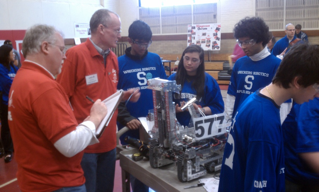
Although most teenagers know how to use a Playstation 3 controller, few know exactly how much they can do with it. There are the obvious functionalities, like gaming, but this year Harris Durani ’11 and the rest of the robotics team are putting the PS3 controller to a more productive use.
“The thing I love about physics is it’s simple and elegant,” Durani said. “The same applies for robotics. The simpler we can make it, the more elegant it turns out to be.”
This year, for the third straight time, the robotics team has qualified for the First Tech Challenge (FTC) World Championship in St. Louis, Mo. Two years ago, the team took home a second place crown, and just last year they came in third while also breaking the FTC record for points scored in one game (600).
This year the team went 9-0 at the Connecticut state tournament to secure their spot at Worlds. However, with the success comes hard work. According to the team, they work on the robot for 20 hours each week and up to 40 hours the week before competitions.
“While we’re waiting in the hotel room before Worlds, instead of sleeping we’ll be building robots,” Durani said.
To maximize their productivity, the team built a full-scale robotics arena in team members Alec Solder ’14 and John Solder’s ’12 basement. The arena is equipped with all the obstacles the robot will face while attempting to complete its ultimate objective at Worlds.
This year’s objective is to place as many batons, located in holsters on the arena walls, in the designated regions of the playing field as possible. The team has 40 seconds for their robot to run autonomously, followed by two minutes of manual control.
However, the robot can also only be made out of the FTC regulated parts.
“There are limitations on everything, even on the brand of rubber bands we’re allowed to use,” John Solder said. “It’s not like we can go to Home Depot and build this robot.”
These strict regulations make the budget for the team tight, according to Solder. Last year the team was given $500 from the school and $5,000 from PepsiCo, the makers of Pepsi. This year they have gotten virtually nothing.
“We have to pay for seven round-trip tickets to St. Louis and the special delivery of the robot, and that’s just for the team,” Solder said. “We also have to take into account the parent chaperones and the accommodations. The budget issue has really made it hard.”
However, this does not deter the team from doing what they love to do: building robots. According to Solder, the key to the team’s success has been the passion of the seniors and their mentorship to the first-year members on the team.
“We have dedicated seniors who are passing their information on to the rest of the dedicated members on the team,” Solder said. “This is really the culmination of their experience and our new knowledge.”
Team-wide, the feeling is mutual.
“Without Harris, our robot would probably be only one channel,” team member Mrinal Kumar ’14 said.
The seniors are as crucial as they are, the team says, because they are a completely independent group, without the benefit of a coach or supervisor. Even at this disadvantage, they still manage to feed off of their passion for robotics and continue to succeed.
“In a Valentine’s Day issue of one of my favorite comics, it basically sums up how I feel about robotics; it brings up the square root of love,” Durani said. “The people keep on trying to find a solution, but in the end it’s impossible to figure out.”














































Haris Durrani • Mar 30, 2011 at 2:43 pm
Great article! Thanks. 🙂
However, I think it’s also important we recognize the crucial role of one of our most important members and senior mentors this year: Timothy Yang. He has been teaching the freshmen a lot of the programming skills in addition to the mechanical engineering involved in building this year’s robot. Without Tim Yang, we would be nowhere! 🙂